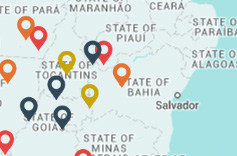Ironides Rodrigues Center for Afro-Brazilian Studies
Legal worship grounds: the blessed people learning and guaranteeing their rights
Rio de Janeiro
Objetivos e público prioritário
The project’s goal is to inform and train the clergy and practitioners of Afro-descendant religions on the legal aspects related to the right of freedom of belief and religion guaranteed by the Brazilian Constitution. It also seeks to raise awareness among legal professionals, both public and private, and public administrators on the rights and guarantees of people who belong to these spiritual communities, contributing to the construction of a real religious democracy in Brazil and collaborating in the combat against different forms of intolerance and discrimination.
Main activities
• Creation of folders, banners, videos and pages on social networks dealing with the project’s themes;
• Holding of meetings that will deal with themes related to human rights and the daily legal issues involved in religious practice;
• A negotiation session involving the participation of church leaders, judges, the Public Prosecutor’s Office and OAB;
• Photographic and video records of the activities.
Context
The social image and negative representations of Afro-Brazilian religions have contributed to the intensification of conflicts in various environments such as school and the workplace. In the health sector, for instance, one can note the difficulties that Family Health Program faces in guaranteeing service to those who live on religious properties.
In the communications field, the increasingly negative portrayal of these spaces is noticeable, with attacks targeting the traditions and an emphasis on putting them down.
The religious grounds are considered spaces of black cultural resistance, and their members still suffer racism, social stigma and prejudice, resulting in their social vulnerability.
About the organization
The Ironides Rodrigues Center for Afro-Brazilian Studies aims to combat racism, sexism and all forms of intolerance; value and increase the potential of religious knowledge and the recognition of these spaces as promoters of education, culture, health, income generation and human rights; monitor and intervene in public policies, exercising social control.
Partnerships
The organization is affiliated with the National Network of Afro-Brazilian Religions and Health.
Results
Material related to education and communication was prepared and meetings were held to inform about legal aspects related to the exercise of the freedom of belief and religion, and to instrumentalize the terreiro people (people of religions of African origin) in the exercise of citizenship and in the combat against religious intolerance.
Funding Line
Annual Call for Proposals
Year
-
Total Granted
R$ 40,000
Duration
8 months
Main Themes
Confronting racism






